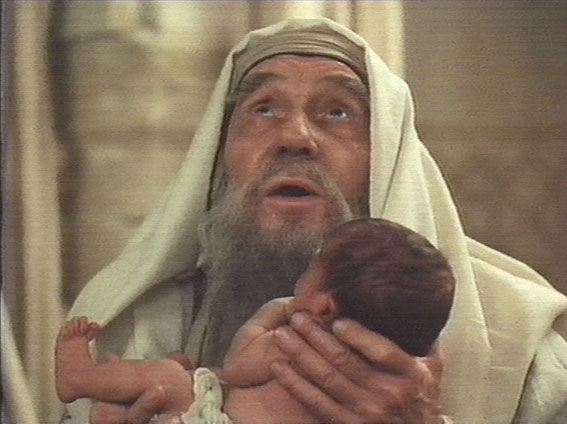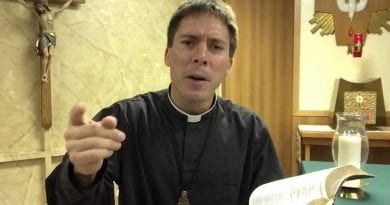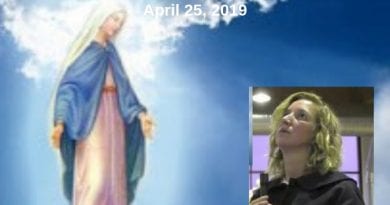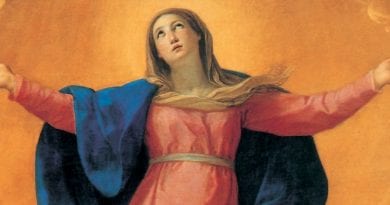Simeon and Anna: the elderly holy pair of the Christmas Octave
During the Christmas Octave’s gospels there is an elderly holy pair which their names features quite often in the liturgical readins. Their names are Simeon and Anna. In fact, we find them on December 29, where Simeon is mentioned in Luke 2:22-35 whilst, on December 30, it is the turn of Anna to be mentioned by the same evangelist, precisely in Lk 2:36-40. As a pair they come the last in a series of three pairs, that is Zechariah and Elizabeth, Mary and Joseph and, then, Simeon and Anna.
These senior citizens, Anna of eighty-four and Simeon, although the Lukan text is silent regarding his age, nevertheless it can be inferred that he is old, are both led by the Holy Spirit. As a matter of fact, Simeon was told by the Spirit that he would not die until first he had seen the Messiah. On the other hand, the fact that we are told that his life was drawing to a close shows how essential it was for him to use the little time he had to live responsibly. To fulfil his mission of witnessing to Jesus and of prophesying to Mary about Her Son and her destiny too, required from Simeon years of preparation.
The figure of Anna illustrates to us the beauty of aging gracefully. She wisely spent her years on earth to serve the Lord in the Temple. Even if she suffered excessively due to her husband’s abrupt demise, her grieving, emptiness and loneliness of a widow catapulted her to God and His service at the Temple. Instead of blaming God for what had happened to her, throwing her faith in the bin and becoming indifferent to the Lord by ceasing to pray, the brave and wise Anna committed herself wholeheartedly in a life of prayer and fasting regularly. Thus, she invested in her holiness.
How greatly Saint Methodius of Olympus (d.311) extolls the figure of Anna in his Oration on Simeon and Anna when he says:
Wherefore with divine wisdom did he, who had foreknowledge of these events, oppose the bringing in of the thankful Anna to the casting out of the ungrateful synagogue. Her very name also pre-signifies the Church, that by the grace of Christ and God is justified in baptism. For Anna is, by interpretation, grace (no.12).
This great woman of faith, a woman of “grace” in Methodius’ words, teaches us how to deal with our losses and bitter disappointments profitably. The Temple was her reference point not her home, meaning God was everything for her. In this way, she was saved from herself. In the Lord’s House Anna could remain in contact with other people too. In our lives Anna’s example is telling us to go to Mass daily and be of service to others. By doing so we are rescued from being the perpetrators of destructive gossip or just sit at home watching TV from morning till evening. Prayer is our strength to be recreated throughout the day. It is only by prayer that we can really be born again in the Holy Spirit.
On his end Simeon reminds us of the importance of being spiritually ready for our death. This holy remembrance about his death and his preparation for it was possible because Simeon was a man of prayer. His righteousness, his careful adherence to the Law’s precepts, his faith, and his virtue all stemmed from his time spent with God. His relationship with God made more and more Simeon’s heart docile to the Holy Spirit’s workings in and through him. Simeon was happy to die in the Lord but not until accomplishing his mission, to see the Messiah. And as the day came by, he took the Baby Jesus into his arms and declared: Lord, now lettest thou thy servant depart in peace, according to thy word; for mine eyes have seen thy salvation which thou hast prepared in the presence of all peoples,a light for revelation to the Gentiles, and for glory to thy people Israel (Luke 2:29-32).
I am really amazed by the words the Father of the Church Saint Methodius of Olympus put on the lips of Simeon in his famous Oration on Simeon and Anna:
I long for You, O Lord God of my fathers, and Lord of mercy, who hast deigned, of Your own glory and goodness, which provides for all, of Your gracious condescension, with which You incline towards us, as a Mediator bringing peace, to establish harmony between earth and heaven. I seek You, the Great Author of all. With longing I expect You who, with Your word, embracest all things. I wait for You, the Lord of life and death. For You I look, the Giver of the law, and the Successor of the law. I hunger for You, who quickens the dead; I thirst for You, who refreshes the weary; I desire You, the Creator and Redeemer of the world (Isaiah 43:10). You are our God, and You we adore; You are our holy Temple, and in You we pray; You are our Lawgiver, and You we obey; You are God of all things the First. Before You was no other god begotten of God the Father; neither after You shall there be any other son consubstantial and of one glory with the Father. And to know You is perfect righteousness, and to know Your power is the root of immortality (Wisdom 15:3). You are He who, for our salvation, was made the head stone of the corner, precious and honourable, declared before to Sion. For all things are placed under You as their Cause and Author, as He who brought all things into being out of nothing, and gave to what was unstable a firm coherence; as the connecting Band and Preserver of that which has been brought into being; as the Framer of things by nature different; as He who, with wise and steady hand, holds the helm of the universe; as the very Principle of all good order; as the irrefragable Bond of concord and peace. For in You we live, and move, and have our being (Acts 18:28) Wherefore, O Lord my God, I will glorify You, I will praise Your name; for You have done wonderful things; Your counsels of old are faithfulness and truth; You are clothed with majesty and honour. For what is more splendid for a king than a purple robe embroidered around with flowers, and a shining diadem? Or what for God, who delights in man, is more magnificent than this merciful assumption of the manhood, illuminating with its resplendent rays those who sit in darkness and the shadow of death? (Isaiah 42:7; Luke 1:79) Fitly did that temporal king and Your servant once sing of You as the King Eternal, saying, You are fairer than the children of men, who among men art very God and man. For You have girt, by Your incarnation, Your loins with righteousness, and anointed Your veins with faithfulness, who Yourself art very righteousness and truth, the joy and exultation of all (Isaiah 11:5) Therefore rejoice with me this day, you heavens, for the Lord has showed mercy to His people. Yea, let the clouds drop the dew of righteousness upon the world; let the foundations of the earth sound a trumpet-blast to those in Hades, for the resurrection of them that sleep has come (Isaiah 45:8). Let the earth also cause compassion to spring up to its inhabitants; for I am filled with comfort; I am exceeding joyful since I have seen You, the Saviour of men (2 Corinthians 7:4). (no.6).
Simeon’s life turning point was when he took him up in his arms and blessed God (Luke 2:28). In other words, when he embrace entirely and closely Jesus to his heart. It is at that point when his fear of death, doubt, unreconciled sin or anything that impeded him to let go just went away. Now, Simeon was a new man. He was ready to go in peace, joy and trust to meet His God whom he loved so much.
What a magnificent way of preparing for death! If we embrace Jesus and let him enter into our hearts we too will be ready to go to our real home, our Heavenly Jerusalem!
As Saint Sophronius teaches us in his sermon which we find at the Office of Readings for the Feast of the Presentation of the Lord, February 2nd, the second reading:
The true light has come, the light that enlightens every man who is born into this world. Let all of us, my brethren, be enlightened and made radiant by this light. Let all of us share in its splendour, and be so filled with it that no one remains in the darkness. Let us be shining ourselves as we go together to meet and to receive with the aged Simeon the light whose brilliance is eternal. Rejoicing with Simeon, let us sing a hymn of thanksgiving to God, the Father of the light, who sent the true light to dispel the darkness and to give us all a share in his splendour. Through Simeon’s eyes we too have seen the salvation of God which he prepared for all the nations and revealed as the glory of the new Israel, which is ourselves. As Simeon was released from the bonds of this life when he had seen Christ, so we too were at once freed from our old state of sinfulness. By faith we too embraced Christ, the salvation of God the Father, as he came to us from Bethlehem. Gentiles before, we have now become the people of God. Our eyes have seen God incarnate, and because we have seen him present among us and have mentally received him into our arms, we are called the new Israel. Never shall we forget this presence; every year we keep a feast in his honour.
Let us keep looking for the Lord! Let us remain in communion with the Lord no matter what we go through! This is the life lesson Simeon and Anna teach us, according to Pope Francis’ homily during the eucharistic concelebration with the members of the institutes of consecrated life and the societies of apostolic life on the Feast of the Presentation of the Lord, on Saturday 1 February 2020, in Saint Peter’s Basilica at the Vatican:
But let us look to the Gospel and see Simeon and Anna: they were elderly, alone, yet they had not lost hope, because they remained in communion with the Lord. Anna “did not depart from the temple, worshiping with fasting and prayer night and day” (Luke 2:37). Here is the secret: never to alienate oneself from the Lord, who is the source of hope. We become blind if we do not look to the Lord every day, if we do not adore him. To adore the Lord.
Fr Mario Attard OFM Cap





